September 10th 2020 is World Suicide Prevention Day.
CDC data indicates that suicide and suicidal ideation is higher in men aged 18-24, essential workers, blacks, and Hispanics who never graduated high school or serve as unpaid adult caregivers.
According to the Morbidity and Mortality weekly report published by the CDC, 40.9% of survey respondents reported at least one adverse mental or behavioral health condition, including symptoms of anxiety disorder or depressive disorder (30.9%), symptoms of trauma- and stressor-related disorder (TSRD) related to the pandemic.
This compares to less than 178 COVID-19 infections per 100,000 Americans that were severe enough to require hospitalization. The overall cumulative COVID-19 hospitalization rate was 178.2 per 100,000, with the highest rates in people aged 65 years and older (481.5 per 100,000) and 50–64 years (266.3 per 100,000). (See CDC published statistics.)
If you need help:
- Contact your physician, a therapist, or other behavioral health professional for a confidential discussion and assessment to discuss how you’re feeling
- There is a national U.S. suicide prevention hotline at 800-273-8255, go to https://suicidepreventionlifeline.org or see the Lifeline chat https://suicidepreventionlifeline.org/chat/
CDC data: suicidal ideation is higher in men 18-24 and essential workers
Suicidal ideation is higher in men aged 18-24, essential workers, black and Hispanic, who never graduated high school or who serve as unpaid adult caregivers
According to the U.S. Centers for Disease Prevention and Control (CDC):
- In 2003, suicide was the 11th overall leading cause of death in the United States and was responsible for 31,484 deaths,[i] which equated to one suicide every 17 minutes.
- In 2018, suicide is the 10th leading cause of death in the United States. It was responsible for more than 48,000
- During June 24–30, 2020, U.S. adults reported considerably elevated adverse mental health conditions associated with COVID-19. Younger adults, racial/ethnic minorities, essential workers, and unpaid adult caregivers reported having experienced disproportionately worse mental health outcomes, increased substance use and elevated suicidal ideation.
Suicide attempts and other acts of self-harm that result in nonfatal injuries affect the health of many persons and families. In 2004, approximately 535,000 visits to U.S. emergency departments were made after attempted suicides or because of other self-inflicted injuries.[ii]
These statistics aren’t just numbers; they are friends, members of a family, partners, parents, sons, and daughters.
Male Behavioral Health and Suicide
According to the UK based my GP, there are significant differences between genders. The number of suicides is much higher among males than females across all age groups in the world. In the UK, men are three times more likely to die by suicide than women.
When asked why they don’t get routine medical care such as an annual physical, men often report vague issues like a busy schedule.
Avoid trivializing men’s mental health.
Probably one of the most essential and significant points to consider. Avoid saying things that invalidate a man’s feelings—for example, “man up,” and “why are you so emotional?”. Instead, acknowledge the person’s feelings, show empathy, and provide support. If you find that you don’t know what to say, even listening without judgment is the best thing you can do.
CDC Data from June 2020 indicates males age 18 to 24 have had higher ideations of suicide, mental health symptoms, and substance abuse.
Prevent Suicide by Encouraging men to express emotions
Expressing emotion and crying are normal reactions for all people, regardless of gender. Don’t associate crying or stereotypically feminine traits with being weak. Processing emotions make us human—encourage the men in your life to acknowledge this.
Prevent Suicide by Checking in with your friends and family
Dropping in, whether it is by their house or in their texts, shows that you’re there for them, and they can rely on you for support. Feeling alone is a massive symptom of depression, so let them know they’re not.
Essential workers are at significantly higher risk of suicide and have experienced greater adverse mental or behavioral health symptoms.
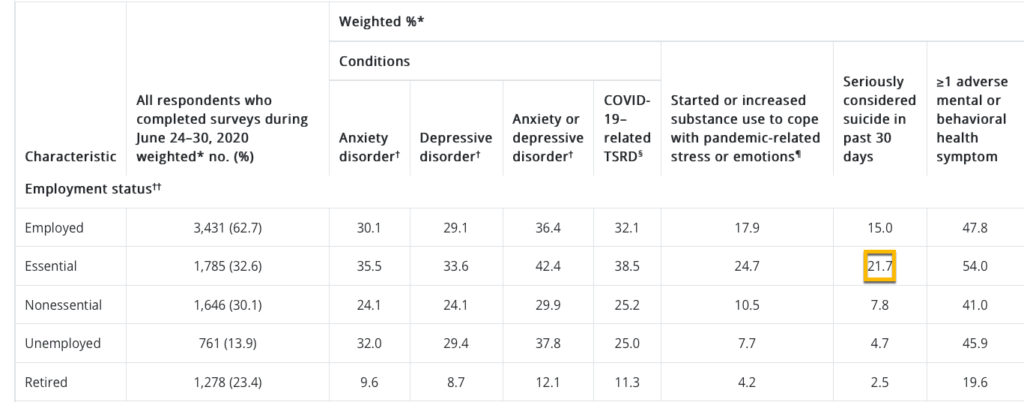
Unpaid adult caregivers are also at higher risk with higher ideations of suicide
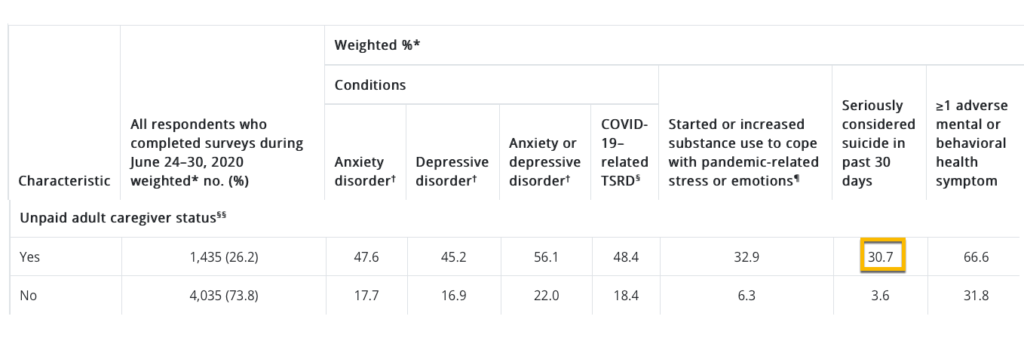
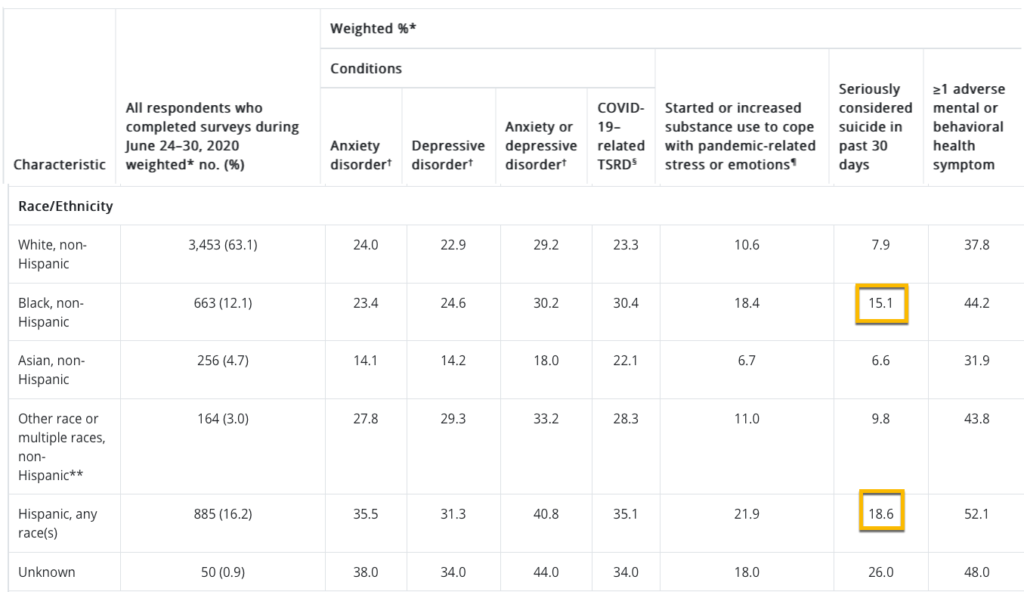
[i] Hoyert DL, Heron MP, Murphy SL, Kung H. Deaths: final data for 2003. Natl Vital Stat Rep 2006;54
[ii] McCaig LF, Nawar EN. National hospital ambulatory medical care survey: 2004 emergency department summary. Advance data from vital and health statistics; no 372. Hyattsville, MD: National Center for Health Statistics; 2006
Related Posts:

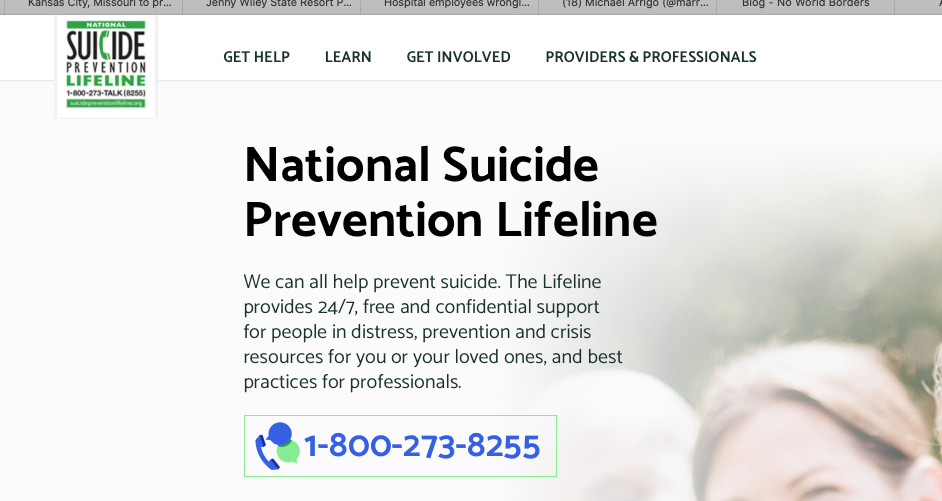
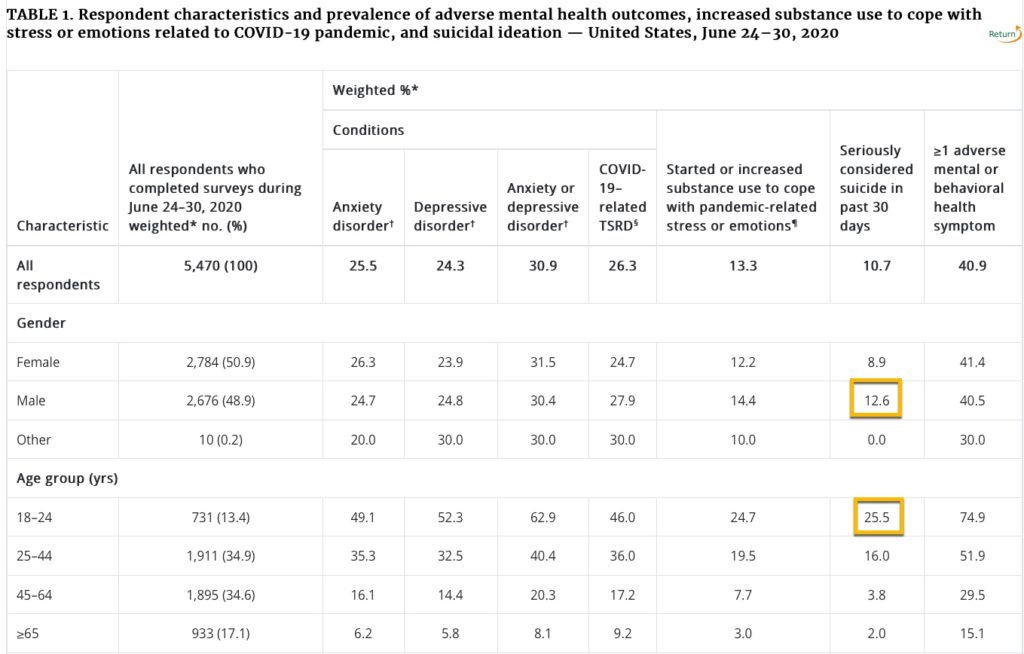 CDC data June 2020 on suicidal ideation by age and gender as well as the incidence of substance abuse
CDC data June 2020 on suicidal ideation by age and gender as well as the incidence of substance abuse